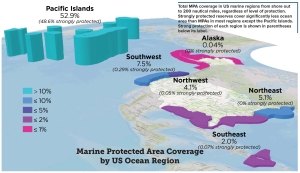Biodiversity a global economic risk
The World Economic Forum has listed the loss of biodiversity to be one of the top 10 global risks our planet faces.

Courtesy: Hakai Magazine,Illustration by Mercedes Minck https://hakaimagazine.com/news/how-mpas-can-pay-for-their-own-protection/
Marine Protected Areas, or MPAs, are vast swathes of the ocean that when enforced correctly, act just like the U.S. national parks system. They protect biodiversity against overfishing and the destruction of habitats and ecosystems by ecotourism. MPAs are meant to protect against mega fishing and shipping industries, but can often hurt local populations, indigenous communities. Thankfully there may be a shift in thinking towards more inclusive solutions in the realm of marine conservation.
Nine organizations, including the Bezos Earth Fund, have pledged $5 billion over the next decade to “support the creation, expansion, management, and monitoring of protected and conserved areas of land, inland water, and sea, working with Indigenous Peoples…”
Four tiers of MPAs exist: Fully Protected, Less Protected, Designated, and Proposed. The Eastern Tropical Pacific Marine Corridor is the latest proposed MPA involving
Ecuador, Panama, Columbia, and Costa Rica. There are a fair number of MPAs around North and South America, with the most around Australia, and the least around the coast of Europe and England.
But a very small percentage of proposed or existing MPAs are fully enforced, rarely with the inclusion of local community leaders if at all. In fact, MPAs are the victim of their own success when fishers target the conservation areas for their rich biomass. New strategies, like the Conservation Finance Area proposed by UCSB scholars, could work. Ensuring local communities have a say in how MPAs are enforced will be critical to their success.
“We can use science to translate ancestral wisdom into a modern context, and highlight another path forward—one that is not only more effective but also addresses environmental justice issues for indigenous peoples,” says a biocultural ecologist at the Hawaiʻi Institute of Marine Biology.

Image from: https://marine-conservation.org/us-seastates-2021/
Despite countries pushing ahead with their conservation efforts, we can see that overfishing and habitat destruction faces an enforcement problem. By charging fishers for access to areas just outside the MPAs, enforcement could pay for itself. It’s what we do to protect the integrity of our waterways and national lands, why not the ocean as well?
If crafted correctly, the CFA could provide a perpetual budget for the enforcement of MPAs. Coupled with a new international funding mechanism like the Community Land Rights and Conservation Finance Initiative (CLARIFI), we could see MPAs fulfill their promise of being a superpower in the fight to conserve and heal our oceans.
We have severely altered two-thirds of the ocean, with only 2.8% of the ocean fully or highly protected from fishing. The problems we face start with our actions and flow elsewhere, not just downstream. Scientists have found major plastic pollution in the MPAs in the Mediterranean. Over half of the plastic found came from elsewhere.
If these big blue walls are breached, if these precious superhighways for marine life are exploited, everyone loses. Loss of biodiversity = lower productivity = lower economic performance. We know that MPAs work to various degrees, supercharging the health of ecosystems by allowing fish to mature, reversing the trend of shrinking sea life from fishery-induced evolution. If we can support indigenous communities in their effort to restore degraded MPAs, it will go a long way in maintaining the health of our oceans.
Tune into the Ocean Plastic Virtual Summit which is free to join and runs from Jan 25-26, you can sign up here.
OPLN will be holding a US-specific plastic treaty dialogue on Jan 27 from 12-2 eastern. Open invitation, no fees for participation.
Thank you to our ecosystem of partners for stepping up the past two years, keeping the Barrel Bag community connected and thriving.

We are ecstatic to share with you that our team and our partnerships have grown! We are also thrilled to join The Global Plastics Treaty Dialogue. While we strongly believe in the power of one, we know the fight against plastic pollution takes a united force for good. Here is to a fantastic start of the year, and a continued commitment to keeping our oceans healthy.





